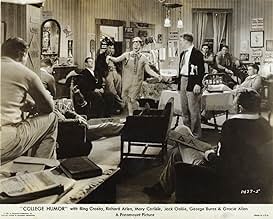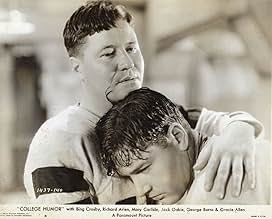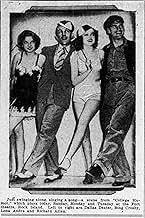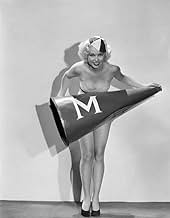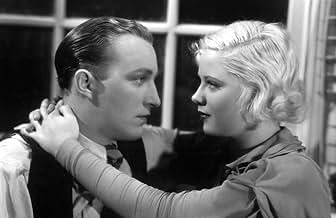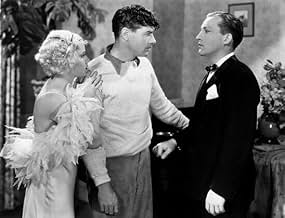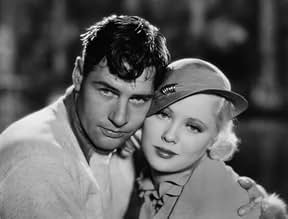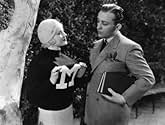Aggiungi una trama nella tua linguaA college professor and the school's star football player are both rivals for the same beautiful coed.A college professor and the school's star football player are both rivals for the same beautiful coed.A college professor and the school's star football player are both rivals for the same beautiful coed.
- Regia
- Sceneggiatura
- Star
George Burns
- George Burns
- (as Burns and Allen)
Gracie Allen
- Gracie Allen
- (as Burns and Allen)
Joe Sawyer
- Tex Roust
- (as Joseph Sawyer)
Edward J. Nugent
- Whistler
- (as Eddie Nugent)
Recensioni in evidenza
With a title based on the popular magazine founded in 1920, COLLEGE HUMOR is a major ensemble piece with the rapidly rising Bing Crosby singing several songs. The plot, such as it is, concerns Mary Carlisle (in the first of three pairings with Der Bingle) pursuing professor Crosby, with him much in favor of the idea and football player Richard Arlen unhappy over the couple. Jack Oakie is Carlisle's brother, on the varsity team and paired with Mary Kornman. Burns & Allen are also around for laughs and singing.
Paramount was still unsure about how to deal with Crosby, and of his three musical numbers, two are elaborately shot production numbers and the romantic "Moon Struck" is staged to feature Miss Carlisle's figure. Cinematographer Leo Tover uses a lot of back-lit high lighting.
Looking back 85 years, it's a sentimental and stereotypical college musical of the era, in which academia is all about sex and football, but director Wesley Ruggles directs as if these are the important things about college. The result is a very amusing bit of fluff.
Paramount was still unsure about how to deal with Crosby, and of his three musical numbers, two are elaborately shot production numbers and the romantic "Moon Struck" is staged to feature Miss Carlisle's figure. Cinematographer Leo Tover uses a lot of back-lit high lighting.
Looking back 85 years, it's a sentimental and stereotypical college musical of the era, in which academia is all about sex and football, but director Wesley Ruggles directs as if these are the important things about college. The result is a very amusing bit of fluff.
I haven't seen this movie, but I just read an (unconfirmed) story about it today:
The football game scenes of "College Humor" were filmed in Riddick Stadium on the campus of North Carolina State University in Raleigh, NC! The stadium has since been torn down, and the only remaining remnant of the site is the old field house (re-purposed several times since the 1950s when games moved to a new stadium), which is now used as a construction office. The building is due to be torn down and replaced by a parking garage in 2009.
http://www.wral.com/news/local/blogpost/1802170/
Not sure if anyone can confirm this or not.
According to the story, the field house was so small that there was not enough room for the whole team to sit down for meetings!
The football game scenes of "College Humor" were filmed in Riddick Stadium on the campus of North Carolina State University in Raleigh, NC! The stadium has since been torn down, and the only remaining remnant of the site is the old field house (re-purposed several times since the 1950s when games moved to a new stadium), which is now used as a construction office. The building is due to be torn down and replaced by a parking garage in 2009.
http://www.wral.com/news/local/blogpost/1802170/
Not sure if anyone can confirm this or not.
According to the story, the field house was so small that there was not enough room for the whole team to sit down for meetings!
During the 1930s, films about college were very, very popular...even though most folks at the time could never dream of affording to go to college. And, most of these films are fluff...with little in the way of plot. This is DEFINITELY true with "College Humor"...a film that is so slight and plotless...even compared to films like "Horse Feathers"!
Instead of plot, this film seems to be made up of snippets. So, while I could try to explain the plot, I won't other than to say it's mostly about football. Additionally, one of the professors (Bing Crosby) spends a lot of time crooning and occasionally putting the moves on one of the co-eds. And, Burns & Allen are there...well...for no reason whatsoever.
Because there is almost no plot and a few of the characters complete jerks (Richard Arlen and Joe Sawyer's are both good examples), it's a film I am loathe to recommend. It's not awful...it just seems more slight, more silly and more of a time-passer than usual for this ever so slight genre.
By the way, like so many of these college films, most of the students are well into their 30s!
Instead of plot, this film seems to be made up of snippets. So, while I could try to explain the plot, I won't other than to say it's mostly about football. Additionally, one of the professors (Bing Crosby) spends a lot of time crooning and occasionally putting the moves on one of the co-eds. And, Burns & Allen are there...well...for no reason whatsoever.
Because there is almost no plot and a few of the characters complete jerks (Richard Arlen and Joe Sawyer's are both good examples), it's a film I am loathe to recommend. It's not awful...it just seems more slight, more silly and more of a time-passer than usual for this ever so slight genre.
By the way, like so many of these college films, most of the students are well into their 30s!
"College Humor" took place on the college campus of Midwest University where Professor Danvers (Bing Crosby) spent more time crooning than teaching. I know that the movie was just a platform to showcase Bing Crosby's singing and George Burns and Gracie Allen's comedy.
Barney Shirrel (Jack Oakie) was a new student and a new pledge to Delta Alpha fraternity. If you didn't like fraternities to start, "College Humor" won't help any. Barney's senior frat bros were Mondrake (Richard Arlen) and Tex Roust (Joe Sawyer). They were unnecessarily cruel, but I suppose it was all an expected part of frat culture.
This movie, along with not being funny, was in poor taste. One of the coeds, Barbara Shirrell (Mary Carlisle), Barney's sister, openly kissed Mr. Danvers (Bing Crosby) on the mouth in class. The appropriate response would have been to chastise her right away, but Professor Danvers clearly enjoyed it and made himself the third leg of a love triangle.
It was hard to tell if it was a triangle or not. In a normal triangle there is one person who is the object of the love of two others. In this case, Barbara loved Danvers, but it wasn't clear that he loved her. Mondrake loved Barbara, but she didn't quite love him. It was a mess.
Barbara didn't help matters any. She openly flirted with Danvers while being arm and arm with Mondrake. It was a whorish scene that took moxy and shamelessness.
Besides the Barbara mess, the fraternity hazing was a bit too serious. They did hazing in "Animal House," but they made it funny and it wasn't too violent. In "College Humor" the hazing was more serious and definitely too violent.
"College Humor" made college look like a detestable place to be. Frat boys were abusing pledges, pretty girls were romantically involved with their teachers, all the school pride was based on the football team, and jocks were expected to be treated special. "College Humor" was not a good showcase of what a healthy college looks like.
Free on YouTube.
Barney Shirrel (Jack Oakie) was a new student and a new pledge to Delta Alpha fraternity. If you didn't like fraternities to start, "College Humor" won't help any. Barney's senior frat bros were Mondrake (Richard Arlen) and Tex Roust (Joe Sawyer). They were unnecessarily cruel, but I suppose it was all an expected part of frat culture.
This movie, along with not being funny, was in poor taste. One of the coeds, Barbara Shirrell (Mary Carlisle), Barney's sister, openly kissed Mr. Danvers (Bing Crosby) on the mouth in class. The appropriate response would have been to chastise her right away, but Professor Danvers clearly enjoyed it and made himself the third leg of a love triangle.
It was hard to tell if it was a triangle or not. In a normal triangle there is one person who is the object of the love of two others. In this case, Barbara loved Danvers, but it wasn't clear that he loved her. Mondrake loved Barbara, but she didn't quite love him. It was a mess.
Barbara didn't help matters any. She openly flirted with Danvers while being arm and arm with Mondrake. It was a whorish scene that took moxy and shamelessness.
Besides the Barbara mess, the fraternity hazing was a bit too serious. They did hazing in "Animal House," but they made it funny and it wasn't too violent. In "College Humor" the hazing was more serious and definitely too violent.
"College Humor" made college look like a detestable place to be. Frat boys were abusing pledges, pretty girls were romantically involved with their teachers, all the school pride was based on the football team, and jocks were expected to be treated special. "College Humor" was not a good showcase of what a healthy college looks like.
Free on YouTube.
COLLEGE HUMOR (Paramount, 1933), directed by Wesley Ruggles, is one of many college campus musicals made during the Depression 1930s, highlighted with music and a football game finale.
Following his success in THE BIG BROADCAST (1932), Bing Crosby shows promise in his initial top-billed feature role, which is actually a second lead part as Frederick Danvers, a professor at Midwest University. In support are some over-aged college students, including Richard Arlen as Ralph, a football star whose career declines due to drunken disorderly conduct and jealous rages; Jack Oakie, the real star of the movie, as his football playing pal, Barney; Joseph Sawyer (billed Sauers) as a tough named "Tex", who excels in beating up on Oakie in one scene during a college initiation; with blonde and perky Mary Carlisle as Arlen's girlfriend who has a crush on her crooning professor; and Mary Kornman as Oakie's girlfriend, Amber. With the trials and tribulations amongst the students, the lighter moments go to the comedy team of George Burns and Gracie Allen, appearing in a few scenes as college caterers. They even take a moment out to sing an Irish song, "Colleen of Korlarny." Gracie manages to sing well, even in character. With music and lyrics by Arthur Johnson and Sam Coslow, the catchy tunes include "Play Ball" (sung by off screen singers during opening credits/re-prised in opening story by Crosby); "The Old Ox-Road" (sung by Jack Oakie/ students/ Crosby); "Learn to Croon" (sung by Crosby/ students); "Moon Struck" (sung by Crosby as he plays piano); along with reprises of "Learn to Croon" and "Play Ball" before the closing cast credits.
What makes COLLEGE HUMOR interesting in itself is seeing a young Crosby in an offbeat yet small role, while Jack Oakie was actually the central character. Crosby would return to college again in later years, most notably as a student in the then popular SHE LOVES ME NOT (1934). Unseen regularly since broadcast on public television in the 1980s, it had its very rare cable television showing on Turner Classic Movies (TCM premiere: November 15, 2018).
*Warning: The 2005 video cassette copy distributed by Hollywood's Attic is not complete. Eliminated from the original 80 minute print are the introduction of leading players during the opening credits to the underscoring of "Learn to Croon" followed by Bing Crosby's opening number of "Play Ball." with James Burke, James Donlan and James Conlin (**1/2 Footballs)
Following his success in THE BIG BROADCAST (1932), Bing Crosby shows promise in his initial top-billed feature role, which is actually a second lead part as Frederick Danvers, a professor at Midwest University. In support are some over-aged college students, including Richard Arlen as Ralph, a football star whose career declines due to drunken disorderly conduct and jealous rages; Jack Oakie, the real star of the movie, as his football playing pal, Barney; Joseph Sawyer (billed Sauers) as a tough named "Tex", who excels in beating up on Oakie in one scene during a college initiation; with blonde and perky Mary Carlisle as Arlen's girlfriend who has a crush on her crooning professor; and Mary Kornman as Oakie's girlfriend, Amber. With the trials and tribulations amongst the students, the lighter moments go to the comedy team of George Burns and Gracie Allen, appearing in a few scenes as college caterers. They even take a moment out to sing an Irish song, "Colleen of Korlarny." Gracie manages to sing well, even in character. With music and lyrics by Arthur Johnson and Sam Coslow, the catchy tunes include "Play Ball" (sung by off screen singers during opening credits/re-prised in opening story by Crosby); "The Old Ox-Road" (sung by Jack Oakie/ students/ Crosby); "Learn to Croon" (sung by Crosby/ students); "Moon Struck" (sung by Crosby as he plays piano); along with reprises of "Learn to Croon" and "Play Ball" before the closing cast credits.
What makes COLLEGE HUMOR interesting in itself is seeing a young Crosby in an offbeat yet small role, while Jack Oakie was actually the central character. Crosby would return to college again in later years, most notably as a student in the then popular SHE LOVES ME NOT (1934). Unseen regularly since broadcast on public television in the 1980s, it had its very rare cable television showing on Turner Classic Movies (TCM premiere: November 15, 2018).
*Warning: The 2005 video cassette copy distributed by Hollywood's Attic is not complete. Eliminated from the original 80 minute print are the introduction of leading players during the opening credits to the underscoring of "Learn to Croon" followed by Bing Crosby's opening number of "Play Ball." with James Burke, James Donlan and James Conlin (**1/2 Footballs)
Lo sapevi?
- QuizWhen it premiered in New York City on June 22, 1933, the running time was one hour and eight minutes, and reviewers complained about the "choppy" editing. As a result, missing sequences were restored, and the running time was extended to one hour and twenty minutes, which is the version presently available on DVD.
- BlooperBing Crosby tells his class that they will look at great love scenes in drama "from Ophelia to Cordelia." Cordelia, the king's daughter in King Lear, does not have any love scenes.
- Colonne sonoreDown the Old Ox Road
Music by Arthur Johnston
Lyrics by Sam Coslow
Sung by Bing Crosby, Jack Oakie, Mary Kornman and chorus
I più visti
Accedi per valutare e creare un elenco di titoli salvati per ottenere consigli personalizzati
Dettagli
- Data di uscita
- Paese di origine
- Lingua
- Celebre anche come
- Alegria estudiantil
- Luoghi delle riprese
- Azienda produttrice
- Vedi altri crediti dell’azienda su IMDbPro
- Tempo di esecuzione1 ora 20 minuti
- Colore
- Proporzioni
- 1.37 : 1
Contribuisci a questa pagina
Suggerisci una modifica o aggiungi i contenuti mancanti

Divario superiore
By what name was College Humor (1933) officially released in Canada in English?
Rispondi
